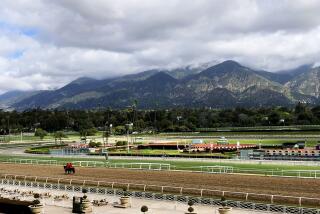A Heavy-Handed Approach
- Share via
The results of trying to apply governmental controls to art productions, like the City of Santa Ana’s effort to regulate performances at its Santa Ana Stadium, are usually the same--all govern and no mental.
The City Council, responding to complaints from residents about the noise and language generated June 28 by a heavy-metal concert at the stadium, has voted to revise the stadium’s rental policy to allow the city to halt concerts if volume exceeds the city’s noise standard or “the performers use profanity.”
The council is concerned about the concerts disturbing residents around the stadium. It doesn’t want to violate the peace and quiet of the neighborhood. That’s understandable. But the council must also be concerned about the U.S. Constitution and violating its First Amendment and free speech guarantees.
Not only is the city attempting to control speech, but the city attorney doesn’t see it as censorship. Other attorneys, specialists in First Amendment rights, think otherwise. They seem closer to the mark than the city attorney.
The city’s intent may not be to censor, but that could well be the result, depending on how it enforces its new policy. For one thing, the wording of the new policy is too vague. It doesn’t specifically spell out what constitutes profanity.
No wonder some attorneys, and the American Civil Liberties Union, are nervous about the council’s approach. The policy may have been adopted to regulate heavy-metal bands, but could it also be used to blacklist certain unwanted groups or controversial performers? Could it also be used to stop other “events” at the stadium, like political rallies or plays, that used some language the city decided was somehow profane? We can think of quite a few talented and established performers, such as Richard Pryor and Eddie Murphy, to name but two, whose shows could never pass muster at Santa Ana Stadium.
The council should have learned a legal lesson from the City of Burbank, which last year lost a six-year battle over its effort to decide which performers should be allowed to appear at a city-controlled theater. The federal courts, including the U.S. Supreme Court, specifically rejected any city attempt at censorship. How much will Santa Ana be willing to spend to defend its new law?
In the next few weeks, specifics on how Santa Ana’s new policy is to be implemented and enforced will be drawn up. A better approach would be to forget about it altogether.
Santa Ana already regulates noise emanating from the stadium. It doesn’t need another law, especially a constitutionally questionable one that tries to put a dangerous and needless limitation on a freedom basic to the performing arts and American society.
More to Read
The biggest entertainment stories
Get our big stories about Hollywood, film, television, music, arts, culture and more right in your inbox as soon as they publish.
You may occasionally receive promotional content from the Los Angeles Times.










